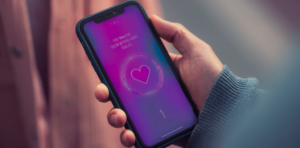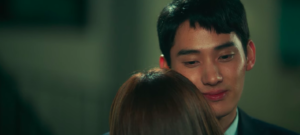
The first season of Love Alarm left viewers with a major cliffhanger. Stuck in a classic love triangle, Kim Jo-jo (Kim So-hyun) was made to choose between the intense Hwang Sun-oh (Song Kang), her first love, and the mild-mannered Lee Hye-young (Jung Ga-ram), her latest and—at that point—only friend. With this tension carefully set up, it seemed like Love Alarm 2 would be going down the Reply route and tease viewers on Jo-jo’s pick right till the very end.
Thankfully, the people behind Love Alarm knew better than to premise their show on this cute but worn-out trick. Instead of asking who ends up with who, they tried to answer a more poignant question; that is, can we learn how to truly love someone? Without all the initial fireworks and immediate passion that we’re told comes with love, can we, by our own volition, give it a chance?
Evidently, Love Alarm is more mature this time around, putting forth a love story that is equal parts sweet and sensible. Though the tech side of things is frayed around the edges, so to speak, it’s a testament to Love Alarm’s strong direction that this otherwise major flaw doesn’t distract from show’s overall impact.
With only six episodes to work with, Love Alarm 2 wasted no time telling us that it’s Hye-young who Jo-jo picks. She passes up the chance to tell Sun-oh the truth about the Shield, a feature that hides her true feelings and prevents her from ringing anyone’s Love Alarm app, but strives to take it down for Hye-young. As she tells Sun-oh later on, “You may have made me install the Shield, but Hye-young makes me want to remove it.”
Sun-oh is on a similar journey with his girlfriend Yuk-jo (Kim Si-eun). Though his enduring feelings for Jo-jo hinders him from ringing Yuk-jo’s alarm, he still tries his best to show his affection. Like Hye-young, Yuk-jo decides to stick it out and wait for her partner to come around. Their patience, like Sun-oh and Jo-jo’s devotion, are put to the test.

By establishing all this early on, Love Alarm 2 proves that it is, more or less, a show about people learning how to love on their own terms. Often in stories, a bigger difference between two people suggests a deeper love, which is perhaps why a lot of fans were rooting for Jo-jo and Sun-oh to still be together. Star-crossed romances are irresistible, after all.
However, real life is rarely this dramatic, at least not initially. After a certain age—and these people are in their 20s—compatibility starts to become a necessity, and its possible evolution into real love is what it makes it so exciting. This is why Jo-jo and Hye-young’s pairing makes sense in Love Alarm 2. They didn’t start out as lovers, but as two people with so much in common. Even without validation from the Love Alarm app, they took it upon themselves to develop their own relationship.
Throughout the drama’s run, Jo-jo and Hye-young fix up a home, walk together to work, and offer a drink when the other is tired. Their shared acts are so simple, tedious even. But as the sweeping and intimate shots of them reveal, they seek and revel in this mundanity. This is in sharp contrast to Sun-oh and Jo-jo’s relationship in season one, which, as thrilling as it was, was also volatile and reckless.
It takes longer for Sun-oh to catch up to his friends’ level of maturity, but he eventually gets there after receiving closure from Jo-jo. When they say their goodbyes in the finale, it’s notable that he pictures her as the 18-year-old, uniform-garbed Jo-jo he fell in love with in high school. His relentless pursuit of Jo-jo in season two was, in fact, a pursuit of a simpler and happier time in his life.
This explains his constant refusal to participate in the routines and responsibilities of adulthood up until that moment. After their farewell, he starts to approach life more seriously, finally bagging a job and returning to Yuk-jo’s arms. “I still can’t ring your alarm,” he tells her in one of his most endearing moments, “but I’ll come back tomorrow and the day after that. If I keep doing that, maybe one day, I’ll be able to ring it.” With that, Sun-oh begins his own foray into a more grown-up kind of love.

True to its title, the drama has a lot of urgent things to say about love, and the technology at the heart of it helps bring those points to life. The Shield, for example, represents the actual barrier brokenhearted people have built up to protect themselves from further pain. Its indestructibility also speaks to the ways in which it can be hard to put down once it’s been up for so long. Likewise, the characters’ constant defiance of Love Alarm’s algorithm suggests our own desire to be in control of our will, free from the dictates of technology or peers.
This is where the show enters Black Mirror territory and starts to get messy. As with all new technologies, Love Alarm has caused a lot of problems since it was founded by Jo-jo’s classmate Cheon Duk-gu (Lee Jae-eung). It inspired cases of stalking, murder, and most disturbingly a mass suicide. But while the show is laudable for tackling these realistic consequences, albeit in background chatter and news bits, it’s baffling that it never condemns them either.

All signs, from the crimes above to the lead characters’ admission of Love Alarm’s futility, pointed to some kind of reckoning or denouncement in the end. But that moment never comes. Bizarrely enough, the one person who sought to change the app’s problematic tendencies, Duk-gu’s brother Brian Cheon (Ki Do-hoon), is the one who’s painted as the villain, while Duk-gu himself, the young genius who founded the latest tech in a fit of love-inspired hysteria, gets away with the mess he caused because of his adorable idealism on human interconnectedness (sounds familiar?).
Moreover, the conclusions drawn are confusing and inconsistent. One minute Duk-gu is waxing poetic about how restricting Love Alarm is akin to restricting love itself, but in the next, he’s advising Jo-jo to lessen her reliance on the app and simply trust her own feelings. In a similar vein, Sun-oh curses “that stupid tech” that leads him to lose Jo-jo, only to make a romantic promise of ringing Yuk-jo’s alarm later on.

In a way, it makes sense for the showrunners to demote this part of the story to a subplot. Love Alarm 2 would be much darker than it already is if they chose to flesh out the ethical and moral ramifications of its tech. In fact, it would be a completely different show (one that I would watch, for the record). And it’s not like it cripples the story with its inconsistencies—Love Alarm is clearly a melodrama before anything else.
Still, there’s something unsettling about the fact that the issues raised were largely left unresolved. In an age where Big Tech reigns as a constant threat to many democracies, this move to glamorize Love Alarm despite its misgivings seems tone-deaf at best and irresponsible at worst. On a smaller scale, it’s also just a waste of setup, unless, of course, there are plans to continue the rich Love Alarm universe and replace its characters with different people each time (again, for the record, would watch).

That said, Love Alarm 2 still stands out in a saturated market of K-drama melos as a mature and sensible love story, with an intriguing edge to boot. The growth of the characters, the love they share, and the empathetic and realistic way these were handled all shine brightly enough on their own. There are even little things, like its gorgeous cinematography and admirable attempts at developing side characters’ personalities (both of which deserve their own reviews), that make this drama all that more watchable.
It is good, but it can be great if you can compartmentalize the whole Non-Evil, Evil Tech part of it, which the show does anyway.
(The New Yorker. Knowledge@Wharton. YouTube [1][2]. Images via Netflix.)


